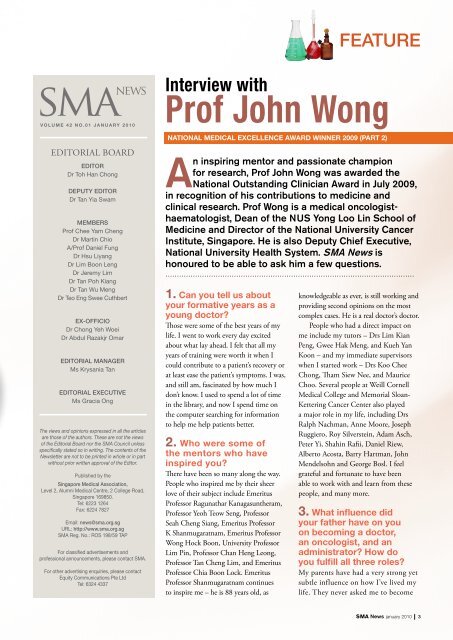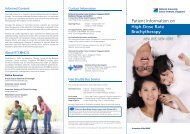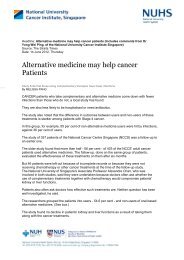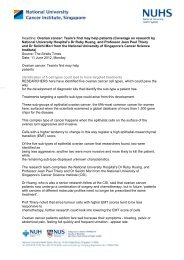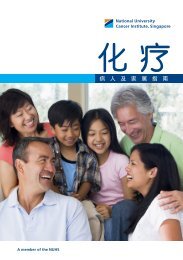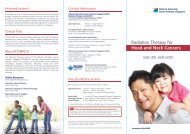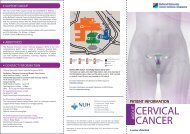Prof John Wong - Home::National University Cancer Institute ...
Prof John Wong - Home::National University Cancer Institute ...
Prof John Wong - Home::National University Cancer Institute ...
Create successful ePaper yourself
Turn your PDF publications into a flip-book with our unique Google optimized e-Paper software.
Volume 42 No.01 JANuARY 2010<br />
Editorial board<br />
EDITOR<br />
Dr Toh Han Chong<br />
DEpuTy EDITOR<br />
Dr Tan Yia Swam<br />
MEMBERS<br />
<strong>Prof</strong> Chee Yam Cheng<br />
Dr Martin Chio<br />
A/<strong>Prof</strong> Daniel Fung<br />
Dr Hsu Liyang<br />
Dr Lim Boon Leng<br />
Dr Jeremy Lim<br />
Dr Tan Poh Kiang<br />
Dr Tan Wu Meng<br />
Dr Teo Eng Swee Cuthbert<br />
Ex-OffIcIO<br />
Dr Chong Yeh Woei<br />
Dr Abdul Razakjr Omar<br />
EDITORIAL MANAGER<br />
Ms Krysania Tan<br />
EDITORIAL ExEcuTIVE<br />
Ms Gracia Ong<br />
The views and opinions expressed in all the articles<br />
are those of the authors. These are not the views<br />
of the Editorial Board nor the SMA Council unless<br />
specifically stated so in writing. The contents of the<br />
Newsletter are not to be printed in whole or in part<br />
without prior written approval of the Editor.<br />
Published by the<br />
Singapore Medical Association,<br />
Level 2, Alumni Medical Centre, 2 College Road,<br />
Singapore 169850.<br />
Tel: 6223 1264<br />
Fax: 6224 7827<br />
Email: news@sma.org.sg<br />
URL: http://www.sma.org.sg<br />
SMA Reg. No.: ROS 198/59 TAP<br />
For classified advertisements and<br />
professional announcements, please contact SMA.<br />
For other advertising enquiries, please contact<br />
Equity Communications Pte Ltd<br />
Tel: 6324 4337<br />
fEATuRE<br />
Interview with<br />
<strong>Prof</strong> <strong>John</strong> <strong>Wong</strong><br />
NAtioNAl mediCAl exCelleNCe AWARd WiNNeR 2009 (PARt 2)<br />
An inspiring mentor and passionate champion<br />
for research, <strong>Prof</strong> <strong>John</strong> <strong>Wong</strong> was awarded the<br />
<strong>National</strong> Outstanding Clinician Award in July 2009,<br />
in recognition of his contributions to medicine and<br />
clinical research. <strong>Prof</strong> <strong>Wong</strong> is a medical oncologisthaematologist,<br />
Dean of the NUS Yong Loo Lin School of<br />
Medicine and Director of the <strong>National</strong> <strong>University</strong> <strong>Cancer</strong><br />
<strong>Institute</strong>, Singapore. He is also Deputy Chief Executive,<br />
<strong>National</strong> <strong>University</strong> Health System. SMA News is<br />
honoured to be able to ask him a few questions.<br />
1. Can you tell us about<br />
your formative years as a<br />
young doctor?<br />
Those were some of the best years of my<br />
life. i went to work every day excited<br />
about what lay ahead. i felt that all my<br />
years of training were worth it when i<br />
could contribute to a patient’s recovery or<br />
at least ease the patient’s symptoms. i was,<br />
and still am, fascinated by how much i<br />
don’t know. i used to spend a lot of time<br />
in the library, and now i spend time on<br />
the computer searching for information<br />
to help me help patients better.<br />
2. Who were some of<br />
the mentors who have<br />
inspired you?<br />
There have been so many along the way.<br />
People who inspired me by their sheer<br />
love of their subject include Emeritus<br />
<strong>Prof</strong>essor ragunathar Kanagasuntheram,<br />
<strong>Prof</strong>essor Yeoh teow Seng, <strong>Prof</strong>essor<br />
Seah Cheng Siang, Emeritus <strong>Prof</strong>essor<br />
K Shanmugaratnam, Emeritus <strong>Prof</strong>essor<br />
<strong>Wong</strong> Hock boon, <strong>University</strong> <strong>Prof</strong>essor<br />
lim Pin, <strong>Prof</strong>essor Chan Heng leong,<br />
<strong>Prof</strong>essor tan Cheng lim, and Emeritus<br />
<strong>Prof</strong>essor Chia boon lock. Emeritus<br />
<strong>Prof</strong>essor Shanmugaratnam continues<br />
to inspire me – he is 88 years old, as<br />
knowledgeable as ever, is still working and<br />
providing second opinions on the most<br />
complex cases. He is a real doctor’s doctor.<br />
People who had a direct impact on<br />
me include my tutors – drs lim Kian<br />
Peng, Gwee Hak Meng, and Kueh Yan<br />
Koon – and my immediate supervisors<br />
when i started work – drs Koo Chee<br />
Chong, Tham Siew Nee, and Maurice<br />
Choo. Several people at Weill Cornell<br />
Medical College and Memorial Sloan-<br />
Kettering <strong>Cancer</strong> Center also played<br />
a major role in my life, including drs<br />
ralph Nachman, anne Moore, Joseph<br />
ruggiero, roy Silverstein, adam asch,<br />
Peter Yi, Shahin rafii, daniel riew,<br />
alberto acosta, barry Hartman, <strong>John</strong><br />
Mendelsohn and George bosl. i feel<br />
grateful and fortunate to have been<br />
able to work with and learn from these<br />
people, and many more.<br />
3. What influence did<br />
your father have on you<br />
on becoming a doctor,<br />
an oncologist, and an<br />
administrator? How do<br />
you fulfill all three roles?<br />
My parents have had a very strong yet<br />
subtle influence on how i’ve lived my<br />
life. they never asked me to become<br />
sma News january 2010 3
fEATuRE<br />
a doctor. on the contrary, they went<br />
to great lengths to show me just how<br />
demanding the profession is. Yet i<br />
could see that there was a certain<br />
satisfaction in what they did, and i<br />
could also see that medicine offered<br />
everything i wanted in a profession:<br />
intellectual stimulation, a chance<br />
to do good for society, and a means<br />
to offer my family a certain degree<br />
of security. the choice of internal<br />
medicine and medical oncology were<br />
my own. i wanted to specialise in a<br />
4 sma News january 2010<br />
is in developing better, more effective,<br />
yet accessible and affordable care for<br />
patients who are so unfortunate as to<br />
develop diseases. <strong>Cancer</strong> care has greatly<br />
improved since i first started in 1988, but<br />
the challenges remain daunting. People<br />
still smoke, live lifestyles that increase<br />
their risk, or decline their mammograms,<br />
colonoscopies, and Pap smears. For those<br />
who are diagnosed with cancer, the cost<br />
of many new drugs is phenomenal. There<br />
is a great deal of work that still needs to<br />
be done in Singapore.<br />
advice to young doctors:<br />
Welcome to one of the world’s most<br />
respected professions. This respect must<br />
be constantly earned and can be lost very<br />
quickly. We are here to help others and not<br />
ourselves. Do great things, but remember<br />
you are here because someone took the<br />
time and effort to share their knowledge<br />
and skills with you. You too must pass<br />
your knowledge and skills on to the next<br />
generation. If we have done our job, you<br />
will be better than we are, and you too<br />
must ensure that the generation after you<br />
surpasses you. Only by doing so can we ensure that<br />
the medical profession is on an upward trajectory.<br />
Photo courtesy of <strong>National</strong><br />
<strong>University</strong> Health System<br />
field that was systemic, not defined by<br />
anatomy or function, where i would<br />
be involved in direct patient care, and<br />
would constantly expose me to the<br />
incredible science that drives cancer<br />
biology. i continue to see patients, as<br />
that is why i went to medical school,<br />
and where i am reminded that there<br />
is so much that we don’t know and<br />
need to learn. i was never trained as<br />
a medical administrator. i see this<br />
role as a term-limited, institutional<br />
national service, which i hope to pass<br />
on to more capable colleagues.<br />
4. What is your passion<br />
today most centred on,<br />
and why?<br />
Preventing disease is the only way we<br />
will really be able to cure it. My passion<br />
5. Can you share with us<br />
some memorable moments<br />
from your medical career?<br />
do you have any regrets?<br />
There have been many memorable events<br />
and i hope there will be many more:<br />
attending the wedding of one of my<br />
former patients, who almost died when<br />
she was in Secondary Four. receiving<br />
a picture of a baby from a proud new<br />
mother – another former patient who<br />
almost died from lymphoma six years<br />
ago. Seeing patients go home after<br />
surviving severe infections. receiving a<br />
hand-made sweater for my daughter from<br />
the wife of one of my elderly patients<br />
with terminal leukemia, who lived by the<br />
park where my daughter used to play.<br />
i often wish that i could have done more<br />
for my patients. My chief regret is not<br />
having been able to spend more time<br />
with my family.<br />
6. What has brought you<br />
the most satisfaction in<br />
your professional journey?<br />
Seeing patients get better; seeing many<br />
of my younger colleagues become better<br />
doctors, teachers, researchers and leaders<br />
than i could ever hope to be; seeing nurses,<br />
pharmacists, and allied health professionals<br />
gain the respect and recognition for the<br />
invaluable work that they do.<br />
7. How do you think<br />
Singapore can keep its<br />
lead as a hub for excellent<br />
medical services and<br />
training?<br />
First by recognising that we don’t have any<br />
lead. There are places in the region that<br />
can do what we do with results that are as<br />
good if not better, and at less cost. The day<br />
we think we have “arrived” is the day that<br />
we start declining. Yes, we do have a good<br />
healthcare service with a few peaks. is our<br />
training good? We can call it good only if<br />
our students are better than we are. is our<br />
medical service excellent? We can say it<br />
is excellent only if we can prevent disease<br />
from occurring, and for those who are<br />
unfortunate as to develop disease, to make<br />
sure that healthcare is effective, affordable,<br />
accessible, and safe every time we deliver it.<br />
8. do you have any thoughts<br />
on the third medical school<br />
not under NuS? Will this<br />
have any impact on the Yong<br />
loo lin School of medicine<br />
(YllSom) students?<br />
This proposal is under active consideration<br />
and deliberation by many capable people.<br />
9. Can you comment on<br />
the blogs highlighting<br />
the tensions between the<br />
YllSom and duke-NuS<br />
students, as well as your<br />
thoughts on the proposed<br />
residency programme?<br />
it would be most unfortunate if there<br />
is unhappiness between students of
Photo courtesy of <strong>National</strong> <strong>University</strong> Health System<br />
<strong>Prof</strong> <strong>John</strong> <strong>Wong</strong> with Minister for Health Khaw Boon Wan, Sivashankar Subramaniam, former Medical Society President, and Liang Hanlong, Project Director,<br />
Public Health Screening 2009 Committee.<br />
both medical schools. both are funded<br />
from the public purse, and both exist to<br />
serve Singapore and the community we<br />
live in. There is so much to do and so<br />
much to learn. if students from either<br />
school think that whether they will be<br />
great doctors is determined by what<br />
happened in medical school, they will<br />
be sadly disappointed. i know some very<br />
average doctors who come from very<br />
famous medical schools, and i know<br />
some great doctors who have come<br />
from medical schools you may not have<br />
heard of. at the end of the day, it’s how<br />
hungry we are, what we make of life<br />
and opportunities, and how we play the<br />
cards we are dealt. destiny is made,<br />
not ordained.<br />
The proposed residency programme<br />
is a major step forward in enhancing<br />
medical education in Singapore. We should<br />
approach postgraduate education with the<br />
same rigour that we do undergraduate<br />
education, with a structured curriculum,<br />
graded competencies, formative and<br />
summative assessments, and institutional<br />
responsibility.<br />
10. Can you share some<br />
advice on balancing career<br />
with a social life and family?<br />
it is challenging but i have a very<br />
understanding spouse, children, and a<br />
circle of friends who remind me not to<br />
take myself too seriously. it has been<br />
said many times before, but it’s true<br />
that no one says on their deathbed that<br />
they should have spent more time in<br />
the office.<br />
11. What would you advise<br />
younger doctors who<br />
would like to follow in your<br />
footsteps?<br />
Welcome to one of the world’s most<br />
respected professions. This respect must<br />
be constantly earned and can be lost<br />
very quickly. We are here to help others<br />
and not ourselves. do great things, but<br />
remember you are here because someone<br />
took the time and effort to share their<br />
knowledge and skills with you. You too<br />
must pass your knowledge and skills on to<br />
the next generation. if we have done our<br />
job, you will be better than we are, and<br />
fEATuRE<br />
The day we think we have<br />
“arrived” is the day that we<br />
start declining. Yes, we do<br />
have a good healthcare<br />
service with a few peaks.<br />
Is our training good?<br />
We can call it good only<br />
if our students are better<br />
than we are. Is our medical<br />
service excellent? We can<br />
say it is excellent only if<br />
we can prevent disease<br />
from occurring, and for<br />
those who are unfortunate<br />
as to develop disease, to<br />
make sure that healthcare<br />
is effective, affordable,<br />
accessible, and safe every<br />
time we deliver it.<br />
you too must ensure that the subsequent<br />
generation surpasses you. only by<br />
doing so can we ensure that the medical<br />
profession is on an upward trajectory.<br />
sma News january 2010 5


